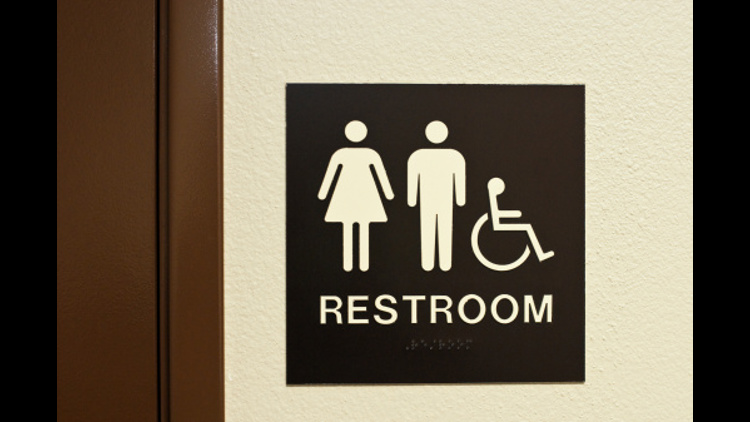AUSTIN, Texas — Gender policy took center stage in the Texas Senate on Wednesday, with lawmakers initially passing two controversial bills. Senate Bill 240, the Texas Women's Privacy Act, requires people to use restrooms and locker rooms according to their biological sex as is stated on their birth certificates. Transgender Texans would not be able to use the private spaces that align with their gender identity, even if they have transitioned.
The debate on the Senate floor included some contentious moments, including when State Sen. Nathan Johnson (D-Dallas) questioned the bill's author, Sen Mayes Middleton (R-Galveston). "Do you have any evidence that men are committing crimes in women's restrooms?" Johnson asked Middleton.

Middleton retorted, "We know it's fundamentally not right to have a man go into a woman's restroom." "That's not my question. You've said it a bunch of times.
My question is, do you have any data?" Johnson asked. "I'm not arguing whether it's right. I don't think anybody thinks it's right for dudes to walk into a woman's restroom all the time.
I think you could throw them out of this building right now without this bill if they do that." Cities, counties and state agencies that don't develop policies to enforce the rule would be fined. The civil penalties for non-compliant entities would be $5,000 for the first violation and $25,000 for subsequent ones, with each day counting as a violation.
The attorney general is empowered to investigate and take action. Fines from penalties go to the compensation of the Victims of Crime Fund. "I have real concerns about what you're doing in this bill on the legal and judicial ramifications," Sen.
Roland Gutierrez (D-San Antonio) said. "Because despite what you're telling us all here, if you can't even get into a courtroom, how in the hell do you get to question the constitutionality of the thing?" SB 240 also requires the Texas Department of Criminal Justice to house inmates in correctional facilities based on their sex as defined by the state. It prohibits transgender women from accessing family-violence shelters designated for women.
The restrictions would not apply to single-occupancy spaces like a single-toilet restroom. The bill does provide exceptions for those helping disabled or young children. Sen.
Middleton said it's necessary to protect the privacy and safety of women and girls. "Senate Bill 240 is about protection, plain and simple. It provides clarity where confusion has taken hold, restores boundaries where they have eroded," Middleton said.
"No woman should be made to feel unsafe or uncomfortable in spaces dedicated to their sex. Safety for women and children is common sense." The bill would apply to restrooms, locker rooms and other facilities in places like the Texas Capitol, public schools, universities, city halls, county courthouses and public libraries.
"I don't want to undress in front of a man in a locker room. It's not appropriate," Sen. Lois Kolkhorst (R-Brenham) said.
"Even though it's private, it's public when you go into a locker room and you're undressing, nor should any little girl feel like that either. It could deter them from playing sports, going to the YMCA or going to a public place undressing in front of men." Sen.
Molly Cook (D-Houston) said she worries this could jeopardize the safety of all women in bathrooms. "As a woman, I'm afraid it's going to make me less safe, and the reason I'm saying that is because there have been numerous reports on non-transgender women being harassed in restrooms because they were mistaken for being transgender," Cook said. In response, Middleton pointed out that 10 states have already passed similar legislation.
"I don't even know what you're talking about with people that would be afraid of this. You can use the restroom," Middleton said. "It was like with the women's sports bill.
Everyone can play sports according to their biological sex. Period. The end.
" Cook said women who "don't look as feminine as some people want them" have been harassed going into the bathroom in multiple states that have passed similar bills and asked how a person who is questioned would need to prove they can use the facility. The Senate tried to pass a bathroom bill in 2017, when it led to a special session but died in the House. But this time around, the bill initially passed on party lines.
The Senate will have to take one more vote on the bill before sending it to the House. There are two identical bills in the House. They are assigned to the State Affairs Committee and have not gotten a hearing.
SCR 42 The Senate also initially passed SCR 42 by State Sen. Bryan Hughes (R-Mineola). The resolution states the policy in Texas is to recognize two sexes: male and female.
"We love and respect people who are struggling in this area," Hughes said. "We also recognize there is scientific truth, there is biological truth, and our laws must be based on the truth. We can love and respect people and help them while we hold up a standard of truth.
" Hughes said there are legal implications that flow from the recognition, such as men in women's locker rooms, men in girls' bathrooms or men in women's sports. "These are difficult issues to deal with, but we must deal with them," Hughes said. During the debate, Democratic senators questioned the intent of the bill and asked how it would impact Texans who are intersex.
Sen. Hughes noted that Gov. Greg Abbott already has a similar executive order in place and argued that, medically, there is no third gender.
In a letter to the heads of state agencies in January, Abbott reiterated that the state only recognizes two genders: male and female. "This office has consistently reiterated a simple truth," Abbott wrote in the letter. "The state of Texas recognizes only two sexes – male and female – and sex discrimination consists in treating a member of one sex less favorably than the other, absent some pertinent difference.
" Last August, DSHS stopped allowing transgender people to get their sex changed on their birth certificates, even if they previously received a court order permitting them to do so. DPS made a similar shift to its driver's license procedures , and the agency does not accept court orders that would change Texans' sex identities unless a specific error was made. Before that, DSHS's website permitted Texans to "correct [a] child's date of birth, place of birth, time of birth [and] sex.
" Now, the only updates allowed are related to errors in filling out birth certificate forms. "We cannot pretend that up is down and down is up. There are certain laws like gravity and certain rules of nature and creation that we all have to live by," Hughes said.
"We all have to live by those rules, and they protect us. They protect our children. The straightforward premise of this resolution is that human beings are born male or female, with such biological identity immutable and innate, with that simple truth.
" Cook, who is openly queer, called the bill a painful attack on transgender Texans. She said the resolution is not to keep women safe but to "tell Texans that they can't live outside of the expected gender binary." She called being out and queer the most liberating experience of her life and talked about how she was made fun of during her upbringing for being a tomboy or boyish.
"Those limits on gender, that insistence that there are innate and immutable characteristics that go along with it, is something that leads to violence against women," Cook said. "We should be investing in proven prevention efforts like considering the role of masculine socialization that's all over the news right now, acceptance of gender norms, and how forcing stereotypes can cause distress in adolescents and adult men." Cook said she feared the resolution could be "a kindling for the hot flame of violence.
" "For all of human history, people have existed outside of this gender binary. And to be honest with y'all, I think it's kind of arrogant of us to write this kind of policy from the state level," Cook said. "To think that we have a better understanding of gender and sex than the people who are experiencing it.
" The resolution passed on party lines and will need another vote before heading to the House..
Politics

Texas Senate passes bill restricting transgender restroom access

Senate Bill 240 requires people to use restrooms and locker rooms according to their biological sex as is stated on their birth certificate.















